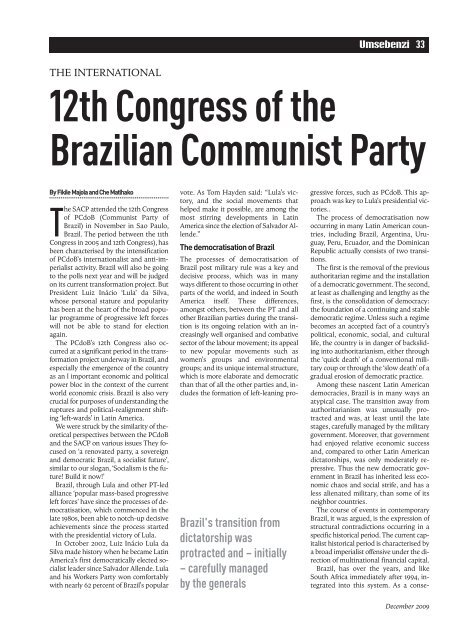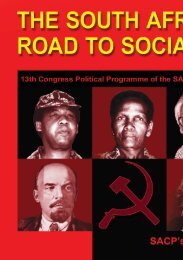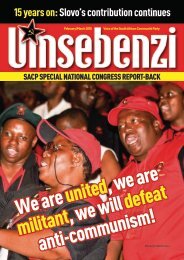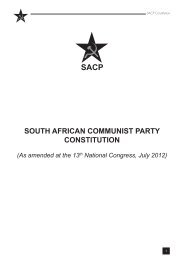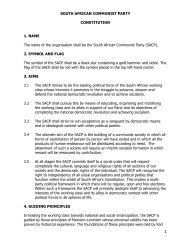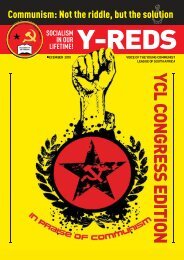Forward to Socialism!! - South African Communist Party
Forward to Socialism!! - South African Communist Party
Forward to Socialism!! - South African Communist Party
You also want an ePaper? Increase the reach of your titles
YUMPU automatically turns print PDFs into web optimized ePapers that Google loves.
Umsebenzi 33<br />
THE INTERNATIONAL<br />
12th Congress of the<br />
Brazilian <strong>Communist</strong> <strong>Party</strong><br />
By Fikile Majola and Che Matlhako<br />
The SACP attended the 12th Congress<br />
of PCdoB (<strong>Communist</strong> <strong>Party</strong> of<br />
Brazil) in November in Sao Paulo,<br />
Brazil. The period between the 11th<br />
Congress in 2005 and 12th Congress), has<br />
been characterised by the intensification<br />
of PCdoB’s internationalist and anti-imperialist<br />
activity. Brazil will also be going<br />
<strong>to</strong> the polls next year and will be judged<br />
on its current transformation project. But<br />
President Luiz Inácio ‘Lula’ da Silva,<br />
whose personal stature and popularity<br />
has been at the heart of the broad popular<br />
programme of progressive left forces<br />
will not be able <strong>to</strong> stand for election<br />
again.<br />
The PCdoB’s 12th Congress also occurred<br />
at a significant period in the transformation<br />
project underway in Brazil, and<br />
especially the emergence of the country<br />
as an l important economic and political<br />
power bloc in the context of the current<br />
world economic crisis. Brazil is also very<br />
crucial for purposes of understanding the<br />
ruptures and political-realignment shifting<br />
‘left-wards’ in Latin America.<br />
We were struck by the similarity of theoretical<br />
perspectives between the PCdoB<br />
and the SACP on various issues They focused<br />
on ‘a renovated party, a sovereign<br />
and democratic Brazil, a socialist future’,<br />
similar <strong>to</strong> our slogan, ‘<strong>Socialism</strong> is the future!<br />
Build it now!’<br />
Brazil, through Lula and other PT-led<br />
alliance ‘popular mass-based progressive<br />
left forces’ have since the processes of democratisation,<br />
which commenced in the<br />
late 1980s, been able <strong>to</strong> notch-up decisive<br />
achievements since the process started<br />
with the presidential vic<strong>to</strong>ry of Lula.<br />
In Oc<strong>to</strong>ber 2002, Luiz Inácio Lula da<br />
Silva made his<strong>to</strong>ry when he became Latin<br />
America’s first democratically elected socialist<br />
leader since Salvador Allende. Lula<br />
and his Workers <strong>Party</strong> won comfortably<br />
with nearly 62 percent of Brazil’s popular<br />
gressive forces, such as PCdoB. This approach<br />
was key <strong>to</strong> Lula’s presidential vic<strong>to</strong>ries..<br />
The process of democratisation now<br />
occurring in many Latin American countries,<br />
including Brazil, Argentina, Uruguay,<br />
Peru, Ecuador, and the Dominican<br />
Republic actually consists of two transitions.<br />
The first is the removal of the previous<br />
authoritarian regime and the installation<br />
of a democratic government. The second,<br />
at least as challenging and lengthy as the<br />
first, is the consolidation of democracy:<br />
the foundation of a continuing and stable<br />
democratic regime. Unless such a regime<br />
becomes an accepted fact of a country’s<br />
political, economic, social, and cultural<br />
life, the country is in danger of backsliding<br />
in<strong>to</strong> authoritarianism, either through<br />
the ‘quick death’ of a conventional military<br />
coup or through the ‘slow death’ of a<br />
gradual erosion of democratic practice.<br />
Among these nascent Latin American<br />
democracies, Brazil is in many ways an<br />
atypical case. The transition away from<br />
authoritarianism was unusually protracted<br />
and was, at least until the late<br />
stages, carefully managed by the military<br />
government. Moreover, that government<br />
had enjoyed relative economic success<br />
and, compared <strong>to</strong> other Latin American<br />
dicta<strong>to</strong>rships, was only moderately repressive.<br />
Thus the new democratic government<br />
in Brazil has inherited less economic<br />
chaos and social strife, and has a<br />
less alienated military, than some of its<br />
neighbor countries.<br />
The course of events in contemporary<br />
Brazil, it was argued, is the expression of<br />
structural contradictions occurring in a<br />
specific his<strong>to</strong>rical period. The current capitalist<br />
his<strong>to</strong>rical period is characterised by<br />
a broad imperialist offensive under the direction<br />
of multinational financial capital.<br />
Brazil, has over the years, and like<br />
<strong>South</strong> Africa immediately after 1994, integrated<br />
in<strong>to</strong> this system. As a consevote.<br />
As Tom Hayden said: “Lula’s vic<strong>to</strong>ry,<br />
and the social movements that<br />
helped make it possible, are among the<br />
most stirring developments in Latin<br />
America since the election of Salvador Allende.”<br />
The democratisation of Brazil<br />
The processes of democratisation of<br />
Brazil post military rule was a key and<br />
decisive process, which was in many<br />
ways different <strong>to</strong> those occurring in other<br />
parts of the world, and indeed in <strong>South</strong><br />
America itself. These differences,<br />
amongst others, between the PT and all<br />
other Brazilian parties during the transition<br />
is its ongoing relation with an increasingly<br />
well organised and combative<br />
sec<strong>to</strong>r of the labour movement; its appeal<br />
<strong>to</strong> new popular movements such as<br />
women’s groups and environmental<br />
groups; and its unique internal structure,<br />
which is more elaborate and democratic<br />
than that of all the other parties and, includes<br />
the formation of left-leaning pro-<br />
Brazil's transition from<br />
dicta<strong>to</strong>rship was<br />
protracted and – initially<br />
– carefully managed<br />
by the generals<br />
December 2009


